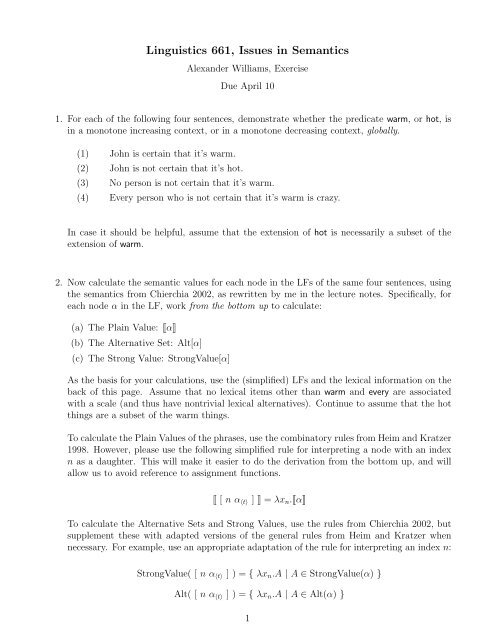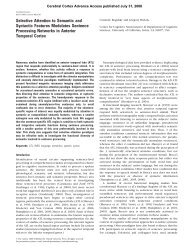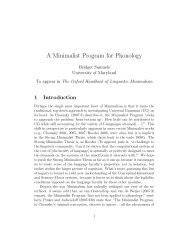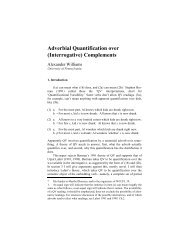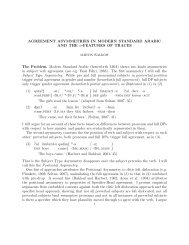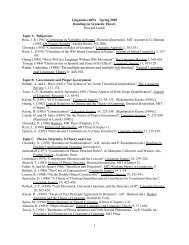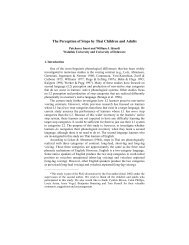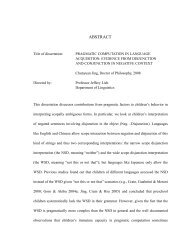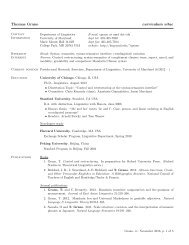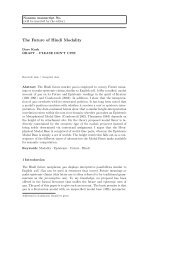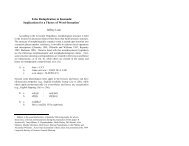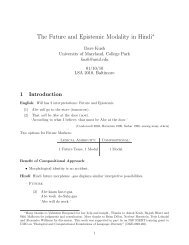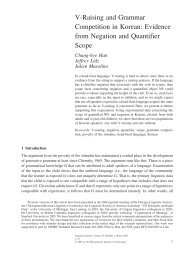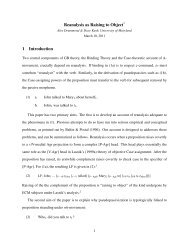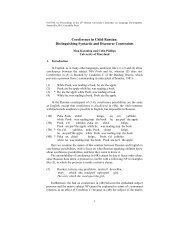Linguistics 661, Issues in Semantics
Linguistics 661, Issues in Semantics
Linguistics 661, Issues in Semantics
Create successful ePaper yourself
Turn your PDF publications into a flip-book with our unique Google optimized e-Paper software.
<strong>L<strong>in</strong>guistics</strong> <strong>661</strong>, <strong>Issues</strong> <strong>in</strong> <strong>Semantics</strong><br />
Alexander Williams, Exercise<br />
Due April 10<br />
1. For each of the follow<strong>in</strong>g four sentences, demonstrate whether the predicate warm, or hot, is<br />
<strong>in</strong> a monotone <strong>in</strong>creas<strong>in</strong>g context, or <strong>in</strong> a monotone decreas<strong>in</strong>g context, globally.<br />
(1) John is certa<strong>in</strong> that it’s warm.<br />
(2) John is not certa<strong>in</strong> that it’s hot.<br />
(3) No person is not certa<strong>in</strong> that it’s warm.<br />
(4) Every person who is not certa<strong>in</strong> that it’s warm is crazy.<br />
In case it should be helpful, assume that the extension of hot is necessarily a subset of the<br />
extension of warm.<br />
2. Now calculate the semantic values for each node <strong>in</strong> the LFs of the same four sentences, us<strong>in</strong>g<br />
the semantics from Chierchia 2002, as rewritten by me <strong>in</strong> the lecture notes. Specifically, for<br />
each node α <strong>in</strong> the LF, work from the bottom up to calculate:<br />
(a) The Pla<strong>in</strong> Value: α<br />
(b) The Alternative Set: Alt[α]<br />
(c) The Strong Value: StrongValue[α]<br />
As the basis for your calculations, use the (simplified) LFs and the lexical <strong>in</strong>formation on the<br />
back of this page. Assume that no lexical items other than warm and every are associated<br />
with a scale (and thus have nontrivial lexical alternatives). Cont<strong>in</strong>ue to assume that the hot<br />
th<strong>in</strong>gs are a subset of the warm th<strong>in</strong>gs.<br />
To calculate the Pla<strong>in</strong> Values of the phrases, use the comb<strong>in</strong>atory rules from Heim and Kratzer<br />
1998. However, please use the follow<strong>in</strong>g simplified rule for <strong>in</strong>terpret<strong>in</strong>g a node with an <strong>in</strong>dex<br />
n as a daughter. This will make it easier to do the derivation from the bottom up, and will<br />
allow us to avoid reference to assignment functions.<br />
[ n α 〈t〉 ] = λx n .α<br />
To calculate the Alternative Sets and Strong Values, use the rules from Chierchia 2002, but<br />
supplement these with adapted versions of the general rules from Heim and Kratzer when<br />
necessary. For example, use an appropriate adaptation of the rule for <strong>in</strong>terpret<strong>in</strong>g an <strong>in</strong>dex n:<br />
StrongValue( [ n α 〈t〉 ] ) = { λx n .A | A ∈ StrongValue(α) }<br />
Alt( [ n α 〈t〉 ] ) = { λx n .A | A ∈ Alt(α) }<br />
1
If you encounter any purely technical problems, don’t panic: be confident, and make a technical<br />
adjustment or an appropriate simplification. Just make sure to tell me what adjustments you<br />
made. Keep <strong>in</strong> m<strong>in</strong>d, my ma<strong>in</strong> <strong>in</strong>terest is that you understand the ideas that Chierchia’s<br />
system is <strong>in</strong>tended to express.<br />
1. Lexical Pla<strong>in</strong> Values<br />
(a) John = j 〈e〉<br />
(b) certa<strong>in</strong> = λφ 〈t〉 λy 〈e〉 .certa<strong>in</strong>(y,φ)<br />
(c) it n = x n<br />
(d) t n = x n<br />
(e) warm = λy 〈e〉 .warm(y)<br />
(f) hot = λy 〈e〉 .hot(y)<br />
(g) person = λy 〈e〉 .person(y)<br />
(h) crazy = λy 〈e〉 .crazy(y)<br />
(i) not = λφ 〈t〉 .¬φ<br />
(j) no = λP 〈e,t〉 λQ 〈e,t〉 ¬∃z[P(z) ∧ Q(z)]<br />
(k) every = λP 〈e,t〉 λQ 〈e,t〉 ∀z[P(z) → Q(z)]<br />
2. Lexical alternatives<br />
(a) Alt(warm) = {hot, warm}<br />
(b) Alt(every) = {every, some}<br />
3. Simplified LFs<br />
John<br />
not<br />
no person 3<br />
certa<strong>in</strong><br />
it 4<br />
warm<br />
John<br />
certa<strong>in</strong><br />
it 4<br />
warm<br />
not<br />
t 3<br />
certa<strong>in</strong><br />
it 4<br />
warm<br />
every<br />
person<br />
5<br />
t 5<br />
crazy<br />
2<br />
not<br />
t 2<br />
certa<strong>in</strong><br />
it 4<br />
warm<br />
2


